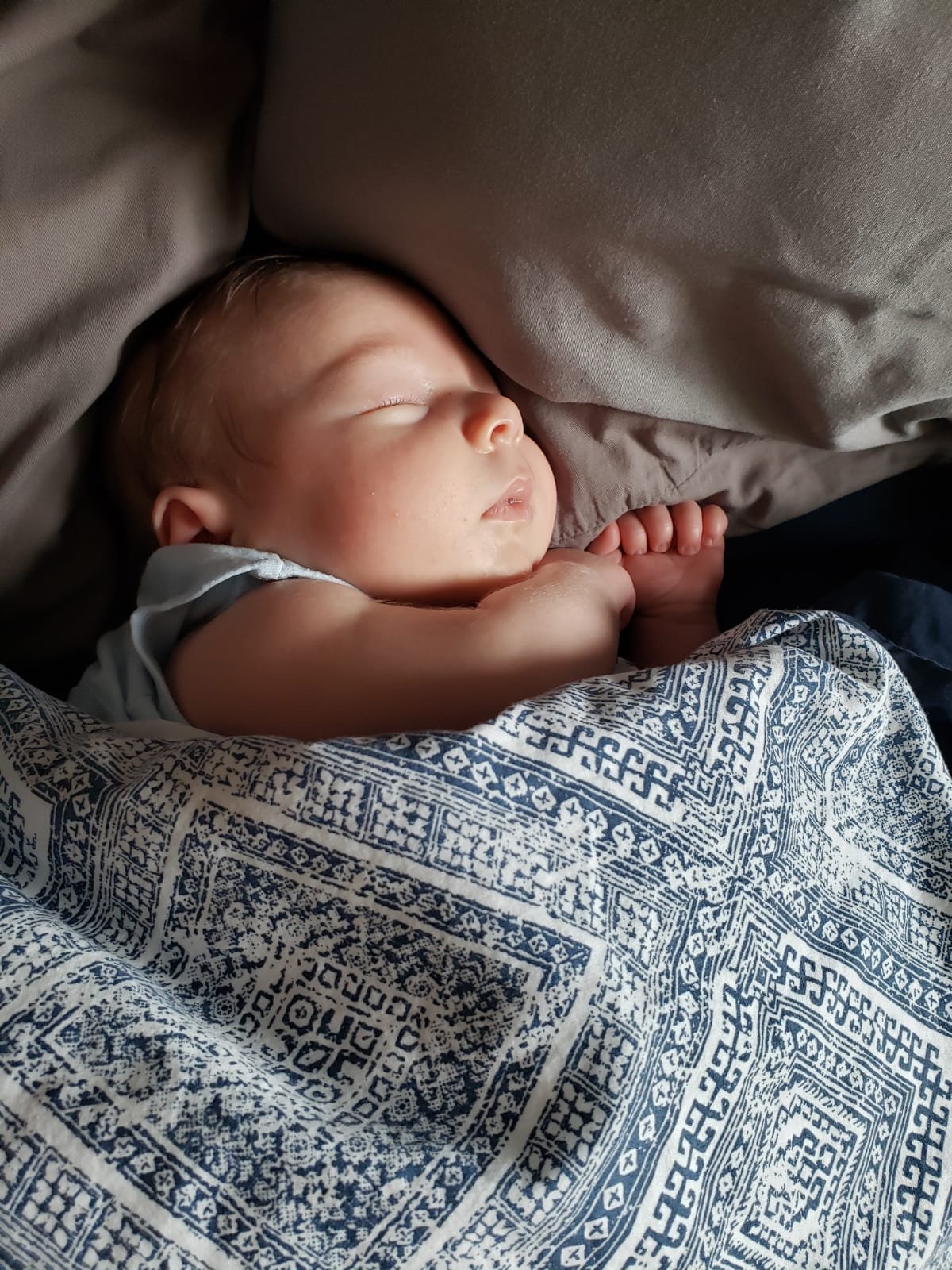Babies, Pumas, and Sleep Deprivation: How Parenting Changes Your Nervous System
Keep content like this free by becoming a member from $5/month
On a Saturday morning of my third cold in about eight weeks, I asked my husband if I could go back to bed for a while and let him handle the baby. He said yes, so I did. Here’s what I thought about:
What if I were in the backyard with the baby and the dog and a puma showed up?
A puma.
I would grab the baby first, right? Then the dog. And then would I run back into the house? Or stand my ground and snarl?
I felt my adrenaline start rising, my heart starting to race. I shook my head internally.
Stop it. You live in a suburb of Edmonton. You’re not going to meet a puma.
I laughed internally. Sweated. Tried to get back to sleep.
This is a lovely example of the postpartum anxiety that still hangs around a little even after my baby’s first birthday. I took a breath. What was my nervous system trying to tell me? I knew my baby was safe, just outside the door. I could hear him cooing and giggling with his dad. Then I realized what it was—a little mom guilt showing up to poke me in the ribs. How dare I take a nap instead of spending time with my baby after he’s been at daycare all week? What sort of a horrible mom am I? What if a puma gets him?
Guys. I don’t even really know what a puma is.
This is a puma.
But here’s the thing. Our nervous systems are not rational. They don’t care that we are as safe as can be with all the doors locked and everyone at home. They read the news. They’ve heard about climate change. They know about the pandemic. They are aware that something unusually bad could happen at any time.
And then, if we become parents, the adrenaline doubles down. Now, we have a small being to protect, so our vigilance notches up, even (especially?) when someone else is watching the kid. We have constant pressure coming from pretty much everywhere to be impossibly perfect parents, especially if we have been raised as/present as women because women are held to a certain punishing standard of motherhood in our society. This is true on an additional layer if we gestated the little being because of all the hormonal earthquakes we have to manage throughout pregnancy and postpartum.
We’re stressed, so our bodies produce stress hormones. We know our kids need patient, loving presence. We know they need co-regulation (a calm body nearby to let them know they can be calm), not resentment and anxiety, so we suppress these feelings (to varying degrees of success). Someone else’s needs will always and forever come before ours, now. So we swallow those feelings, swallow those needs. Our bodies produce more stress hormones and we start all over again.
Besides all this, loving our children is intense. When my baby was born, the only word I could use to describe how I felt about him was “unbearable.” I really couldn’t bear it. He was so sweet, so fragile, needed me so much. I anticipated his little smiles and watched him sleep and snuggled him close. And it hurt. It was terrifying. Loving is vulnerable. It’s risky even when the person we love is a consenting adult who can wipe their own butt. It’s so much more intense when we love a being that does not understand about the world yet and needs protection from pumas.
I literally cannot with this guy.
When we were pregnant, a lot of people told us we’d never sleep again. This wasn’t true, really, and we resented the cliche. Yes, sometimes the baby wakes up at all hours (namely, five am). Yes, there is some sleep deprivation for these reasons, but that’s not really what’s so exhausting about parenting. It’s the vulnerability of loving. The nightmare fantasies when you are trying to have a nap. The constant feeling that everyone else knows how to do this except for you. The fights you have with your partner because parenting triggers every unresolved childhood experience you’ve ever had and healing those things is a lot of work. It is exhausting. But not because of sleep.
When we first tried sleep training, it felt like finding the secret key to the game of parenting. Suddenly the baby was sleeping through the night! Could put himself back to sleep if he woke up! What sleep deprivation? We exulted.
And yes, sleep training helped a lot. I’d recommend it to anyone and will 100% do it again if we have another baby. I actually don’t know how people handle being parents without it. But no matter what kind of sleep training you do, no matter how strict you are about it, you won’t prevent the baby from sometimes waking up in the night anyway. Babies have a lot of reasons to wake up in the night: teething, sickness, weaning, transitions into daycare or other big changes in their lives. Nightmares. Separation anxiety. It’s helpful if they can put themselves back to sleep, but that doesn’t mean they don’t wake up.
And when the baby wakes up, so do I. He goes back to sleep like the proverbial baby he is, and I lie awake worrying about what woke him up. And what kinds of cookies I should bake for the staff at his daycare? And how do I convince him to let me brush his teeth more often? Then I turn over and start thinking about money and work and how to get everything done I need to get done tomorrow. And then, you know, pumas.
Being a parent is hard for a lot of reasons, and it’s not just about whether or not your baby sleeps. Some of what’s hard about it is natural and unavoidable—I’m on my third cold in six weeks because there are a LOT of germs at daycare and all my baby wants to do is stick his fingers in my mouth.
But the parts where we blame ourselves for being imperfect parents, obsess about whether or not we are doing the right things, and worry about things that aren’t currently happening—these are arrows we are sticking into our own flesh. Even when we become aware of this, of course, it doesn’t stop these thoughts from happening, and we can’t always convince ourselves to fall back asleep easily when the baby has been up crying for apparently no reason in the night.
The best we can do is understand that our nervous systems change when we become parents. A lot of things change. We can prioritize self-care: get help if your kid isn’t sleeping well. See a therapist. Get some good childcare (which I know is its own stressful experience) so that you can get a little space for yourself and your relationship. Talk about your feelings. Trust that some of this parenting stuff gets easier (at least, that’s what everyone tells me), but inevitably some other things will get harder, too. The best we can do is accept that, love and enjoy our littles as much as we can in the briefness of the present moment, and try to take another nap.



